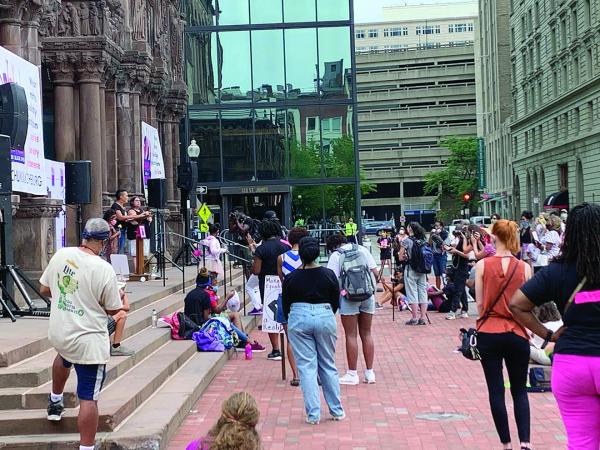July 2, 2020

Activist and Mattapan resident Nashida Baril addressed hundreds of attendees in front of Trinity Church in Copley Square last Saturday. Daniel Sheehan photo
Several hundred people gathered in front of Trinity Church in Copley Square last Saturday to listen as a lineup of activists, artists, and elected officials — all of them women — led a “March Like a Mother For Black Lives” rally.
Most of the speakers at the family-friendly event were Black women from Dorchester, Mattapan, and Roxbury. Included among the ranks were several elected officials who have gone on to represent the communities in which they grew up, including state Rep. Liz Miranda, whose Fifth Suffolk House district includes parts of Dorchester and Roxbury; City Councillor Kim Janey, and District Attorney Rachael Rollins.
Miranda pointed to a familiar trend visible in the main demographic behind the country’s current wave of activism. “There is no movement in American history that has not been led by the young people and the women of this country,” said the representative, who was also critical of Massachusetts’s proclaimed progressivism.
In her remarks, she called for bans against “no knock” police searches and chokeholds and pointed to a 30-year difference in life expectancy between Bostonians who live in Roxbury and those who live in the Back Bay, a statistic from a 2016 Boston University study.
“It’s a blue state until we talk about public safety and criminal justice,” said Miranda. “We should be ashamed to talk about our liberalism.”
Janey echoed Miranda’s comments, thanking “the mamas in the background doing the work” for fueling the movement. She called on rally goers to support women and people of color-owned businesses and noted the momentum of the current moment.
“Our country is at a crossroads,” she said. “There’s a reckoning happening.”
Nashira Baril, an activist and midwife who founded the city’s first birth center in Mattapan, spoke of what she sees as an ongoing “dissonance” in society: the complex co-existence of “black grief and black joy” in the African-American community, as well as a dissonance in white circles between “espoused activism and a lack of action.”
Baril described the ongoing pandemic as a “portal” to another world as she cautioned against a return to normality, emphasizing that in her line of work —the maternal health system— the US lags behind other developed nations, especially when it comes to mortality rates of Black mothers.
Ashley Rose, a Haitian-American poet from Boston, punctuated the defiant, resilient atmosphere of the rally with a reading of her poem, “The Haunting.”
“In 2020, you don’t want to be warring with me,” she read, addressing the American systems of oppression and racism. “Not for another day, not for another decade, and damn sure not for another century. So, from this Black mother, let my children’s children’s children be free in this land that you built on black lives and black backs… or forever be haunted by me.”


